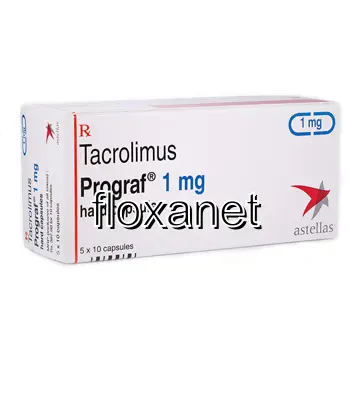| Package | Dosage | Price | Price per Dose | |
|---|---|---|---|---|
| Dosage: 0,5mg | ||||
| 90 pill | 0,5mg | $494.11 | $5.48 | |
| 60 pill | 0,5mg | $351.15 | $5.86 | |
| 30 pill | 0,5mg | $195.69 | $6.52 | |
| 20 pill | 0,5mg | $137.40 | $6.87 | |
| 10 pill | 0,5mg | $73.55 | $7.41 | |
| Dosage: 1mg | ||||
| 90 pill | 1mg | $693.99 | $7.72 | |
| 60 pill | 1mg | $496.89 | $8.29 | |
| 30 pill | 1mg | $292.85 | $9.74 | |
| 20 pill | 1mg | $217.90 | $10.88 | |
| 10 pill | 1mg | $122.13 | $12.27 | |
| Dosage: 5mg | ||||
| 20 pill | 5mg | $662.06 | $33.08 | |
| 10 pill | 5mg | $370.58 | $37.05 | |

Prograf Description
Understanding Prograf: An Overview
Prograf, known generically as tacrolimus, is a prescribed medication primarily used to prevent organ rejection in transplant patients. It is commonly prescribed after kidney, liver, or heart transplants to help the body's immune system accept the new organ. As an immunosuppressant, Prograf works by weakening the immune response, reducing the chance of the body rejecting the transplanted organ. This medication requires careful monitoring and dosing adjustments to balance efficacy with potential side effects.
How Does Prograf Work?
Prograf acts by inhibiting calcineurin, an enzyme involved in activating T-cells, which are key players in the immune response. By suppressing T-cell activity, the drug prevents the immune system from attacking the transplanted organ. The medication is usually taken orally once or twice daily. Due to its potency and narrow therapeutic window, blood levels of tacrolimus are often checked regularly to ensure safety and effectiveness. Proper dosing helps minimize side effects while maintaining transplant health.
Usage and Dosage in the USA
In the United States, Prograf is available by prescription and is typically prescribed following a transplant procedure. The dosage varies based on factors like the type of transplant, patient weight, and response to therapy. Healthcare providers usually start with a specific dose and adjust as needed, frequently monitoring blood levels. It’s important for patients to take the medication exactly as instructed, with or without food, and to never alter their dose without consulting their doctor. Regular follow-up visits are crucial for safe and effective treatment.
Potential Side Effects and Risks
While Prograf is highly effective, it can cause side effects. Common issues may include tremors, headaches, high blood pressure, or gastrointestinal discomfort. More serious but less common effects include kidney dysfunction, infections, or allergic reactions. Because it suppresses the immune system, patients are more vulnerable to infections, including serious bacterial or viral infections. Long-term use may also increase the risk of certain cancers. Patients in the USA should discuss these risks thoroughly with their healthcare provider and report any unusual symptoms promptly.
Special Considerations and Tips
It’s important for patients to maintain regular medical check-ups while on Prograf. Blood tests, kidney function tests, and blood pressure monitoring are essential to keep track of the medication’s effects. Patients should inform their healthcare team about any other medications or supplements they are taking to avoid adverse interactions. Alcohol consumption and certain foods may affect tacrolimus levels, so dietary advice should be followed carefully. Finally, adherence to the prescribed regimen is vital for transplant health and overall well-being.